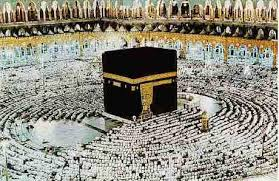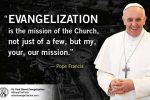Do Muslims and Christians Worship the Same God?

CCC 841, quoting the Dogmatic Constitution on the Church, Lumen Gentium 16, from Vatican II, declared:
The plan of salvation also includes those who acknowledge the Creator, in the first place amongst whom are the Muslims; these profess to hold the faith of Abraham, and together with us they adore the one, merciful God, mankind’s judge on the last day.
Some will say this declaration does not indicate Muslims believe in the same God we do because it only says “Muslims… profess to hold the faith of Abraham,” not that they actually do. So what gives?
The Council fathers were certainly careful to say Muslims “profess…” but not that they “profess” to believe in one God. It says they “profess to hold the faith of Abraham.” “The faith of Abraham” involves more than simply acknowledging that God is one. CCC 59-64 teaches that “the faith of Abraham” includes:
“The people descended from Abraham” who “would be the trustee of the promise made to the patriarchs, the chosen people, called to prepare for that day when God would gather all his children into the unity of the Church” (CCC 60).
The Catechism goes on to point out that the people who possess the true “faith of Abraham” include:
… “the patriarchs, prophets, and certain other Old Testament figures” who “have been and always will be honored as saints in all the Church’s liturgical traditions” (CCC 61).
Paragraphs 63-64 in the Catechism continue:
Israel is the priestly people of God, “called by the name of the Lord,” and “the first to hear the word of God,” the people of “elder brethren” in the faith of Abraham. (64) Through the prophets, God forms his people in the hope of salvation, in the expectation of a new and everlasting Covenant intended for all… a salvation which will include all the nations. Above all, the poor and humble of the Lord… as Sarah, Rebecca, Miriam, Deborah, Hannah, Judith, and Esther… The purest figure among them is Mary.
Muslims could hardly be included in this number.
However, it is a distortion to claim from this that Muslims do not truly believe in the one true God because it was clearly after having said Muslims “profess to hold the faith of Abraham,” that the Council fathers then declared: “… together with us they adore the one, merciful God…”
These are two distinct declarations:
1. [Muslims] profess to hold the faith of Abraham.
2. Together with us they adore the one, merciful God, mankind’s judge on the last day.
CCC 841 also references Vatican II’s Declaration on the Relation of the Church to Non-Christian Religions, Nostra Aetate, 3, that makes the teaching of the Council perhaps even clearer:
The Church regards with esteem also the Moslems. They adore the one God, living and subsisting in Himself; merciful and all-powerful, the Creator of heaven and earth, who has spoken to men; they take pains to submit wholeheartedly to even his inscrutable decrees, just as Abraham, with whom the faith of Islam takes pleasure in linking itself, submitted to God.
Once again, we see first the declaration that Muslims “adore the one God…” made without qualification. Then, the fathers say “Islam link[s] itself” to Abraham. This is not saying there is a link; rather, it is saying Muslims make that link. Once again, we have two clearly distinct declarations.
Is the Muslim God Our God?
There are many things taught in Islam that are so radically opposed to what we believe as Catholic Christians, that some will say, “Well, perhaps they believe in one God, but the ‘one God’ they believe in is not the same God we believe in because, for example, the Koran teaches:
1.Women are inferior to men (Sura 4:34)
2.Men can, and even should, ‘beat’ their wives in some circumstances (Sura 4:34).
3.Belief in the crucifixion and resurrection of Christ is false (Sura 4:157-159).
4.Belief in the divinity of Christ is blasphemy (Sura 5:72).
5.Belief in Jesus Christ as ‘the Son of God’ is grave error (Sura 19:35; 10:68).
6.Muslims are commanded to ‘fight against’ Christians and all who disagree with them. Sura 9:29 says:
Fight those who believe not in Allah, nor in the Last Day, nor forbid that which Allah and His Messenger have forbidden, nor follow the Religion of Truth, out of those who have been given the Book, until they pay the tax in acknowledgement of superiority and they are in a state of subjection.
7.God wills moral as well as physical evil. In fact, Sura 37:94 says, ‘He [Allah] created you as well as what you do,’ whether good or evil.
8.‘God does not love the unbelievers’ (Sura 3:32).
And this is just to name a few areas of major disagreement. We could write volumes on the problems with Muslim doctrine.”
Many claim there is a point where errors regarding what “the one God, living and subsisting in Himself; merciful and all-powerful, the Creator of heaven and earth” teaches become so far removed from the truth that it becomes necessary to say that God being spoken of is no longer “God” at all. My take is that as long as a person understands the basic metaphysical truth that God is “the one, merciful God,” then errors concerning what God has said, or what he has revealed about his inner life are simply errors about those things, not about God as the one, true God.
Some will argue that if someone presents, for example, their “God” as teaching the rape of small children to be okay, then that God is not God at all. And that, I would argue, is true. It could be argued that that “God” would suffer from a moral defect, and therefore, could not be God.
But even if it is possible for a person (or a faith, like Islam) to claim belief in the one true God, but so distort what God teaches that he (or it) ceases to truly believe in the “one true God” in reality, then, according to the Church, Islam has not reached that point in its errors.
Thus, we Catholics have to be careful to distinguish between the fact that Muslims believe in the one true God “living and subsisting in Himself; merciful and all-powerful, the Creator of heaven and earth,” and the fact that they get it wrong—profoundly wrong—when it comes to both who God has revealed himself to be in the New Testament, and what he has taught his people.
We pull no punches as Catholics when it comes to pointing out the errors of Islam. But we also need to begin by getting it right concerning the things about which we agree.
Ask a Saint – He Knows
Pope St. John Paul II strikes the balance beautifully, concisely, and without compromise between acknowledging what Muslims get right, and challenging some of where they go wrong, in his excellent book, Crossing the Threshhold of Hope. After pointing out that the Church has a “high regard for Muslims who worship one God, living and subsistent, merciful and omnipotent, the Creator of heaven and earth,” he then observes after reflecting on Islam and the Koran:
Whoever knows the Old and New Testaments, and then reads the Koran, clearly sees the process by which it completely reduces Divine Revelation. It is impossible not to note the movement away from what God said about Himself, first in the Old Testament through the Prophets, and then finally in the New Testament through His Son. In Islam all the richness of God’s self-revelation, which constitutes the heritage of the Old and New Testaments, has definitely been set aside. Some of the most beautiful names in the human language are given to the God of the Koran, but He is ultimately a God outside of the World, a God who is only Majesty, never Emmanuel, God-with-us. Islam is not a religion of redemption. There is no room for the Cross and the Resurrection (p. 92).
St. John Paul first acknowledges the truth that Muslims get it right when they profess faith in one God. Then, and only then, does he point out they have it as wrong as wrong can be when it comes to what God has revealed to us in Scripture about who he is, and, I would add, what he asks of his people by way of his commandments.
My thanks to Mr. Craig Curtis for helping me with much of the research for this post and the ones that will follow in this series.
If you liked this post and want to go deeper into studying the truth about Islam, click here.






